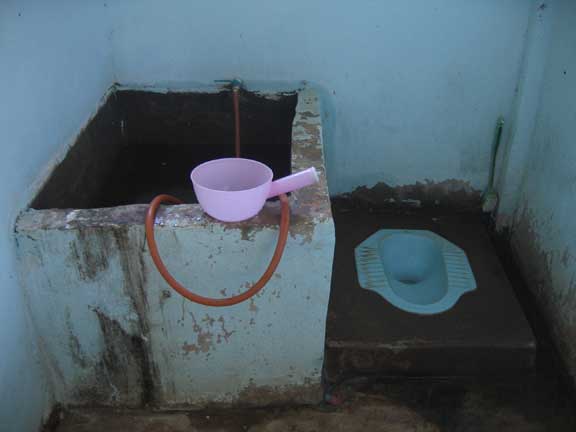
In this post, the second in "Memoir of Miri: an ex-pat's adventures in the land of the headhunters, I explain how I finally gave in and employed Jelimah, my one and only amah.
Jelimah, a thoroughly modern Dayak-Miss, had turned her back on the centuries’ old tribal way of life for the bright lights of Miri— a boom town, where a pretty girl could live in a house like a palace, and wear dresses—not made with cloth she'd woven herself, but purchased from glitzy shops crammed with jewels, creams and perfumes—shops with every delight imaginable to make her beautiful for the parties where she'd laugh and dance all night.
She was an assistant in a drycleaners when I first met her, having swapped the steamy jungle for an even steamier environment, and communal life in her tribal longhouse for a cramped dormitory above the shop, shared with a dozen other starry-eyed refugees.
There was no plumbing or power laid on in the jungle village in the back blocks of Sarawak, where every drop of water for drinking and cooking was drawn from the river. From as long as she could remember, it had been Jelimah’s responsibility to fill the family's water pots at the riverbank and tote them back to the longhouse on stilts at the end of a steep and winding jungle track. She didn't have to go as far for drinking water in her new home- just as far as the toilet. The only available water for washing and drinking was scooped from the cistern - the water tank that flushes and fills the toilet
.
As for me I was paranoid about coming down with dysentery or, ... worse, and so from the moment I arrived in Miri, I boiled our drinking water for three minutes, always said an emphatic no to ice, and only drank Coke from cans. Even now, I shudder at the thought of dipping a cup into a slimy tank. For four years I resisted employing a servant, but after learning how Jelimah lived I felt sorry for her. She became my first amah.
At the time, I felt I was doing something special by opening up my home to her. Heck it was a palace ... so different to what I was used to in Perth. I supposed the deprived jungle girl thought she was in heaven. I mean, it wasn't as if she had anything to do. Apart from some token dusting and sweeping, I continued to do 99% of the household chores. Some people are naturally autocratic. Not me! For the best part of a month, I pussy-footed round, treating her like a young relative, over here on holiday that required entertaining.
How wrong can you be? Jelimah wasn't happy. I now think she would have left her gilded cage sooner if she hadn't set her sights on entering a beauty pageant and needed a sponsor. I didn't hesitate and for the next six weeks everything took a backseat to becoming Miss Miri.
Entering the Dayak beauty pageant was something of a family tradition. Jelimah's aunt has come first, years back and she was keen to follow in the legendary beauty queen's footsteps. The competition was only open to Dayaks. Dayak is a collective name for the indigenous people of Sarawak. However, it isn't a tribe - like Europeans, Dayaks come from many different tribes, each with its own distinctive culture, customs and language. Iban, Kelabit, Bidayuh, Kenyah and Penan are some of the tribes living in the jungles surrounding Miri.
Jelimah was an Iban the most populous and well known of the tribes. She told me she was one of 24 children. I didn't believe her at first. I mean, I have a friend whose mother gave birth to a baker's dozen and my partner has eight siblings. But 24!! Come on ... It turned out it was all true. Multiple births ran in the family- several sets of twins and triplets had swelled the juvenile ranks.
Jelimah never said anything to me about multiple births bringing misfortune. Be-Be told me. Be-Be was another Iban amah that I got to know; our partners worked together. She told me that her tribe believed that malevolent spirits were responsible for multiple births and that they brought bad luck. She said," It's what we believe. It's not just the family who'll suffer. The whole village will be harmed. Rice won't grow, there won't be any wild pigs to hunt, people will get sick and young women will give birth to dead babies."
A triplet herself, she was lucky to survive. Immediately after Be-Be and her siblings were born, they were abandoned outside a convent. Compassion was in short supply. Brought up as servants to the nuns, they were beaten for the smallest transgression and often went hungry. They weren't taught to read or write but that wasn't unusual. I doubt that they'd have fared any better in the education department in their village. However they would, I am sure, have been given the most basic of gifts - a name. Instead the nuns referred to them as A, B and C. I thought that was appalling.
At least the nuns didn't break Be-Be's spirit because she did escape. How the friendless and penniless girl made it to Miri I don't know. But arrive there she did and found work too - in a bakery where she caught the eye of a Canadian Driller. Taking him up on his job offer - he was on the lookout for an amah, an intimate relationship developed. They have now been together for more than 15 years. Things worked out well for this Iban Cinderella. I hope A and C are happy too! But who knows they may still be confined to a life of thankless servitude in the jungle convent.
You should know, I’m not a big believer in fate. I lean toward: ‘I am the captain of my ship and the master of my destiny’ philosophy but sometimes, it seems like fate is determined to wreck your dreams. Take the day of the beauty pageant - everything that could go wrong went wrong, starting with a burst water pipe in the upstairs bathroom. I had promised to drive Jelimah to the beauty parlour – she was having the works, hair, make-up and nails, but I had a flood on my hands. It was immediately followed by another when I suggested she should take the bus.
Sending Jelimah still weeping off in a cab, I spent a frustrating hour trying to find a plumber who understood English. By now water, was dripping through the ceiling into the living room below. Fortunately, the floor was tiled. Alas, that wasn’t the case upstairs. The bathroom was fitted with a thick Wilton carpet, mulberry, and the exact shade of the commercial-size spa and wall tiles.
It was dusk and I was still mopping up after the plumber, and hoping the landlord wouldn’t blame me when Jelimah, exquisite in heavy Asian makeup , her long glossy hair piled on top of her head, secured by jewelled clips, returned. She was accompanied by a stranger, a cousin skilled in the art of folding the traditional kebaya, the intricate blouse, dress worn by Dayak women. The girls disappeared into the bedroom. Their tinkling laughter came to an abrupt halt when ten minutes later the power went off.
Power black outs were a part of life in Miri and I was prepared. I found the candles and gave two to Jelimah. Deep channels in her inch thick make-up wouldn’t do and she bravely held back tears that sparkled in her brilliant eyes, I must admit I’d have cried too if I’d have had to get ready for a big night in the dark.
I never have been keen on driving at night, but my friend Mary-Grace, was just as eager to cheer on Jelimah. She picked us up about seven in her car. The power was still off. ‘But that doesn’t mean it will be off in Krokop too,’ I said to Jelimah, with a confidence I was far from feeling, considering the way our luck was running.
As I expected, the building was in darkness. We parted company, Mary- Grace and I to a gloomy, stifling hall, Jelimah to hot and airless cramped upstairs room, where the humidity played havoc with the entrants’ makeup and hair dos. It was 2 hours before the lights came back on.
Surprise! The beauty pageant wasn’t the only entertainment provided. The main event was preceded by a Malaysian song contest. It went on interminably. Possibly I would have enjoyed it more if there’d been a selection of songs; instead I sat through at least twenty presentations of the same song in Bahasa.
It was midnight before the pageant began. All the girls were utterly gorgeous, none more so than Jelimah. She didn’t win though and yes, there were tears. Jelimah insisted the contest was fixed. Maybe she was right, the winner was no prettier than the other girls but she did have the advantage of being the judge’s niece.
Comforted by her friends, Jelimah departed for a nightclub.
To crown off a catastrophic night, when Mary-Grace and I got back to the car the battery was as flat as a pancake. Two blondes 3.00 am in the wildest part of the wild, wild East and not another ex-pat to be found. We walked back to the hall. Luckily, the manager was still packing up and drove us back home.
Next morning Jelimah told me she was quitting and she was in a hurry; her friends were waiting in the car. ‘Have you got another job,’ I asked, hovering as she packed?
‘Yes,’ she replied. ‘I’ve got my old job back at the dry cleaners.
To paraphrase King Lear, bringing up a child can be a thankless task.

 RSS Feed
RSS Feed
